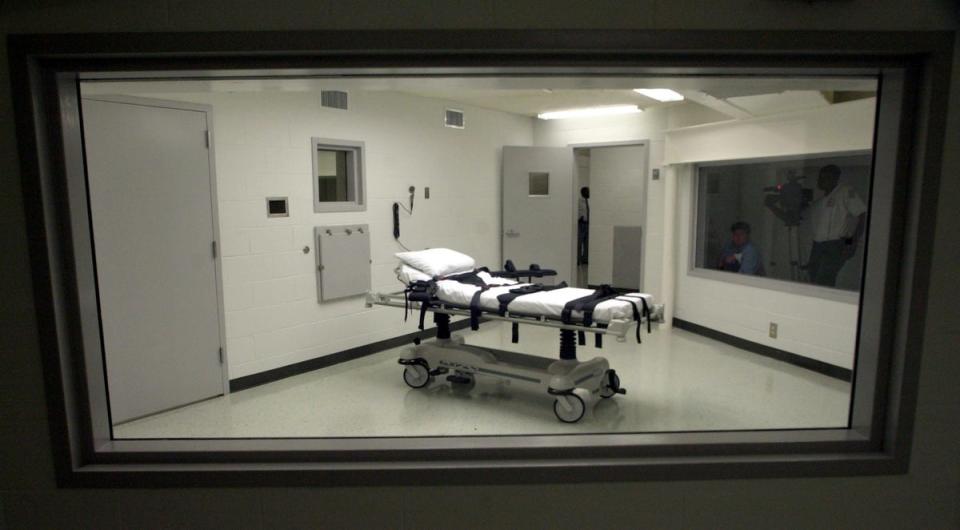Alabama death row inmate asks court to block his execution by nitrogen gas
An attorney for an Alabama inmate set to be the nation’s first person ever put to death by nitrogen gas – a method previously branded “torture” by the UN – has asked for a stay of execution.
Kenneth Eugene Smith, 58, is scheduled to be executed next Thursday using the “untested” method, which has been decried as inhumane by death penalty experts and deemed unfit even for killing most mammals.
Smith will be fitted with a respirator-type mask on his face to replace his breathing air with pure nitrogen — depriving him of the oxygen needed to stay alive.
Three states — Alabama, Oklahoma and Mississippi — have authorized the execution method, known as nitrogen hypoxia, but no state has previously attempted to use it.
If Smith’s execution by nitrogen hypoxia is carried out, it will be the first new execution method used in the United States since lethal injection was first used in 1982.
On Friday the three judges at the 11th US Circuit Court of Appeals asked questions about the proposed method, including claims that it could cause Smith to choke to death on his own vomit. They did not indicate when they will rule on the decision to stay the execution.
Smith’s attorney, Robert Grass, told the judges that the state will “attempt to execute Kenny Smith under unprecedented circumstances," arguing that the plan to deliver the nitrogen gas through a face mask is flawed and could subject his client to a prolonged and unconstitutionally painful execution.

“This is the first time this will ever be attempted. There is no data on exactly what’s going to happen and how this will go forward,” Mr Grass said.
The experimental method comes in the wake of a botched execution attempt, which Smith survived in November 2022.
The 58-year-old, who was sentenced to death over the 1988 murder-for-hire slaying of Elizabeth Sennett in Alabama’s Colbert County, was punctured with intravenous needles repeatedly for nearly four hours.
The execution was eventually called off after prison employees were unable to set an IV line into Smith’s veins, making it the third failed lethal injection attempt in Alabama in 2022.
In fact, it was Smith who requested he be put to death by nitrogen hypoxia, one of three legal methods along with electrocution in the state, following the failed attempt.
When a prisoner challenges a method of execution, the state of Alabama forces them to name an alternative, and Smith filed a lawsuit with the request.
On Friday the Alabama attorney general’s office urged the court to let the execution proceed.
“Alabama has adopted the most painless and humane method of execution known to man,” said Alabama Solicitor General Edmund LaCour.
Mr Grass countered that there was a risk of oxygen leaking into the face mask, possibly subjecting Smith to a prolonged execution and leaving him in a vegetative state instead of killing him.
"Nitrogen gas has never been used in the United States to execute human beings"- Ravina Shamdasani, spokesperson for the @UNHumanRights office on Kenneth Eugene Smith's execution due to happen on January 25 in Alabama⤵️ pic.twitter.com/BtCmniSJ4G
— UN News (@UN_News_Centre) January 16, 2024
He also argued that there is also a possibility that Smith could choke to death on his own vomit, though the state maintained those scenarios are unlikely to happen.
Mr LaCour argued that Smith would not feel pain because the nitrogen would render him unconscious “almost instantaneously.”
The concerns of Smith’s attorneys echo those of the United Nations (UN) earlier this week.
On Wednesday Ravina Shamdasani, spokesperson for the UN Human Rights office said the organisation had “serious concerns” over the proposed execution.
“We are alarmed by the imminent execution in the United States of America of Kenneth Eugene Smith, through the novel and untested method – suffocation by nitrogen gas,” Ms Shamdasani said at a press conference.
“This could amount to torture or other cruel or degrading treatment or punishment under international human rights law.”
Smith has argued in a separate case that after surviving one execution attempt it would violate the federal ban on cruel and unusual punishment for the state to make a second attempt to execute him.
On Friday, Smith asked the US Supreme Court to stay the execution to consider that question.
The Independent and the non-profit Responsible Business Initiative for Justice (RBIJ) have launched a joint campaign calling for an end to the death penalty in the US. The RBIJ has attracted more than 150 well-known signatories to its Business Leaders Declaration Against the Death Penalty – with The Independent as the latest on the list. We join high-profile executives such as Ariana Huffington, Facebook’s Sheryl Sandberg and Virgin Group founder Sir Richard Branson as part of this initiative and are making a pledge to highlight the injustices of the death penalty in our coverage.


